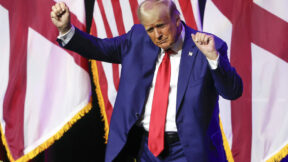Chris Lehmann Talks About His New Book Rich People Things, Plus An Exclusive Excerpt
The following is exclusive excerpt of Rich People Things, a portion of a chapter where Lehmann discusses New York Times columnist David Brooks.
David Brooks staked his claim as new millennial social seer with his breakout 2000 bestseller, Bobos in Paradise, which purported to gently mock the bohemian pretensions of the new American power elite. (These were, in Brooks’s waggish telling, the “Bobos”—a lazy conflation of “bourgeois” and bohemian” that Brooks claimed was a signature new formation on the American social landscape, even though bohemians have always been drawn from the ranks of the bourgeoisie, and rarely harbor any serious ambition to forsake their socioeconomic birthrights.)
But as with many works of pseudo-meritocratic propaganda, Brooks’s labored puckishness proved on closer inspection to be the sincerest form of flattery. For all its consumer excesses, the Bobo class was, in his account, brilliantly adaptive and surprisingly resourceful. Instead of lurching into the sort of cataclysmic hedonism that haunted the prophecies of more dour social critics such as Daniel Bell or Christopher Lasch, Brooks’s affluent Bobos embarked on rigorous regimes of physical and spiritual self-improvement, practicing an enlightened “Modernism for the shareholders”1 and possessing a “Midas touch in reverse,” whereby everything they touch “turns to soul.”
Behind Brooks’s gentle scoffing at the Bobo vogue for distressed furniture and overpriced cave-aged cheese at Whole Foods, in other words, was a tacit bid to extort a very old kind of social deference on behalf of this allegedly new social class—provided, of course, that its members summoned forth the right sort of nationalist fettle and noblesse oblige. In the book’s closing pages, Brooks exhorted the feckless Bobo class to step up to the bar of history and claim its own proper role of stage-managing the world-defining American civilizing mission. Sounding very much like his own imperialist hero Theodore Roosevelt, Brooks fretted that “we may become a nation that enjoys the comforts of private and local life but that has lost any sense of national union and any sense of a unique historical mission. The fear is not that America will decline because it overstretches, but because it enervates as its leading citizens decide that the pleasures of an oversized kitchen are more satisfying than the conflicts and challenges of patriotic service.”
Lasch, a keen critic of Theodore Roosevelt’s mugwump brand of imperial adventurism, astutely dubbed it “the moral and intellectual rehabilitation of the ruling class”—and that is very plainly what Brooks had in mind in his bid to marshal the home-happy Bobo elite into a gauzy ethos of national service. But of course, with the benefit of hindsight, we can appreciate how deeply misguided this reckless conflation of ruling-class rehabilitation and national mission can be.
Following the spirit of the Brooksian playbook to a tee, the United States became mired in a disastrous and illegal imperial mission in Iraq—a project that Brooks enthusiastically cheerled from his perch at the Weekly Standard and the prestigious New York Times op-ed column he inherited from William Safire. And of course the whole rickety debt-based fantasia that permitted countless Bobo homeowners to leverage out their mortgages into upscale kitchen upgrades has collapsed into a smoldering ruin.
The beauty of David Brooks’s brand of just-in-time valentines to the American knowledge elite is that you never have to say you’re sorry— or really that you meant much of anything you said in the first place. Aligning one’s pundit brand with the credentialed smart set means automatically, in these United States anyway, that one is on the right side of history. If anyone has mastered the flexible dictates of Modernism for the shareholders, it’s Brooks himself.
Indeed, the hollowness of the “comic sociology” Brooks sought to perpetrate in his 2000 book, Bobos in Paradise, was exposed the following year, when he composed a faux-anthropological cover story for the Atlantic, exploring the mysterious hinterland sensibilities of “Red America”—i.e., the virtuous right-leaning voting districts and states that went into the George W. Bush column during the hard-fought 2000 election—in Franklin County, Pennsylvania.
True to form, Brooks strung together plausible-sounding tossed-off observations about the shopping mores and cultural sensibilities of the place, all of which allegedly shored up the big-picture thesis of the piece: that Red and Blue America faced off against unfordable culture divides, which in the pie-eyed editorial vision of Michael Kelly’s Atlantic translated into abiding class segregation as well. The only problem is that very few of the telling details Brooks crammed into the piece proved to be, you know, true. For instance, it was quite possible, contrary to Brooks’s airy assertion, to purchase a meal at a local restaurant for more than $20; high-end retail outlets were surprisingly common in a region Brooks claimed was pocked by Dollar Stores and thrift emporiums. Red States did not swarm with QVC home-shopping addicts, as Brooks casually claimed; the network’s highest-volume sales demographic was, in fact, the posh ultraliberal 90210 zip code in Beverly Hills. Nor was Red America the hotbed of NASCAR adoration that Brooks assumed when he claimed that the average Blue State liberal couldn’t name five professional stock car drivers; it turns out that three of the top five viewing markets for NASCAR are in so-called Blue States. And Blue America didn’t abjure hands-on, motor-driven yard work for the convenient leasing of illegal immigrant labor, as Brooks contended; indeed, most major centers of illegal immigrant hires were in agricultural Red States.
When Philadelphia magazine writer Sasha Isenberg ran this litany of contradictory facts by Brooks for his sharply critical 2004 anatomy of both Brooks’s research and mystifying popular acclaim, the young reporter got a sober lecture from Mr. Comic Sociology for his trouble.
“This is dishonest research. You’re not approaching the piece in the spirit of an honest reporter,” Brooks chided his interlocutor. “Is this how you’re going to start your career?”
Brooks well understands, of course, that the way to confidently pilot one’s career upward is to play shamelessly to the broad-as-a-barn cultural prejudices of an elite readership rather than challenging its sensibilities with empirical findings—one reason, among countless, that it is beneath parody for Brooks to have accused Isenberg of “dishonest research.” But there’s no doubt, in pure terms of career ambition, that Brooks had the best of this particular argument. Not long after the unhappy Atlantic episode, he was elevated to the plum perch as the lead conservative columnist for the Times—and from there, he was off and running with all sorts of similar grab-and-go generalizations about the deep-seated cultural determination of everything, from the rancorous mood of Major League Baseball playoffs to the course of global development policy and foreign aid.
But the shtick has worn threadbare as Brooks has turned his culture-bound pundit gaze on things of actual material import, as the course of events since 2008 has mercilessly forced him to do. On a dumbfounding appearance on George Stephanopoulos’s This Week in late 2008, Brooks was holding forth on the prospect of government bailouts for US auto manufacturers, a policy that he of course opposed as a defilement of sainted free market principle. Bailing out automakers would unconscionably introduce “politics” into industrial policy (since, you know, unregulated market activity had done so much to secure our collective economic stability) and this would be a bootless prospect indeed, compared to the existing federal bailout of financial institutions to the tune of $100 billion and more. “That’s a public utility,” he airily proclaimed. When another panel member pressed him on this outlandish claim, he just shrugged. “It’s a metaphor,” he wheedled, in much the same condescending affect that came across in his churlish exchange with Isenberg.
Well, not so fucking much, actually. This particular government-supported metaphor drove millions of homes into foreclosure, de-stabilized global credit markets, and helped plunge manufacturing enterprises like the auto industry past the brink of economic viability. To call this the handiwork of a public utility is akin to awarding a peace prize to Benito Mussolini. But then again, this is someone who could publicly mourn the wayward course of the occupation of Iraq as the miscalculation of a country “blinded by our own idealism”— and then, a week on, seek to rally the flagging spirits of the Invading Faithful with the fanciful incantation that America would prove “adaptable enough to recover from its own innocence and muddle its way to success, as I suspect we are about to do.” There’s your Modernism for the shareholders, right there—a callow optimism of the will in the face of all the familiar ironies and calamities that have attended Western colonialism throughout its long and deeply unattractive history.
Pages: 1 2
This is an opinion piece. The views expressed in this article are those of just the author.




